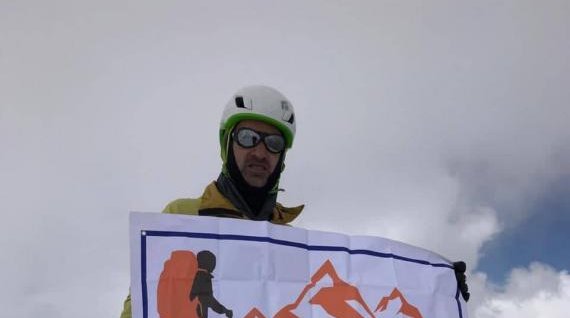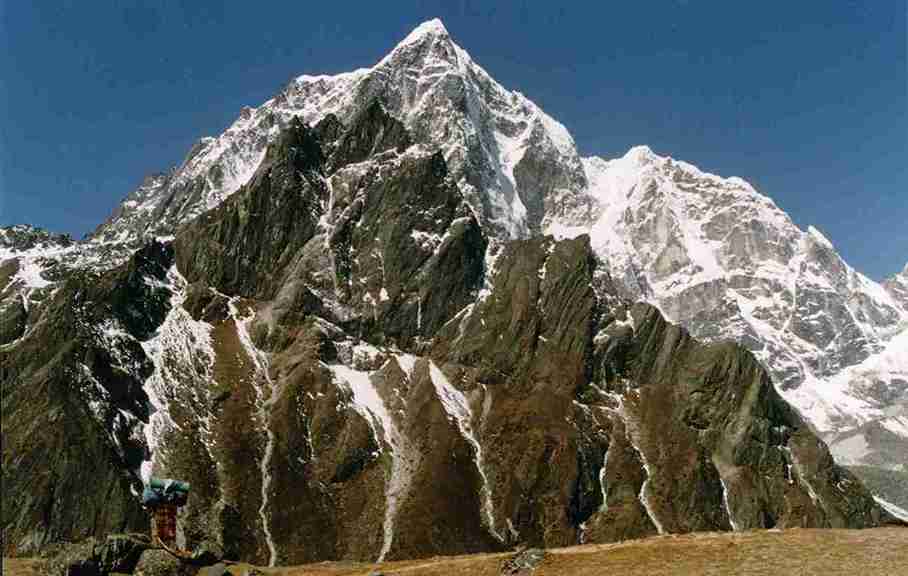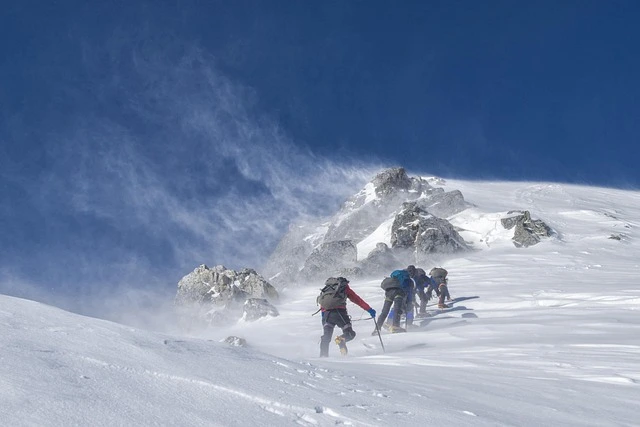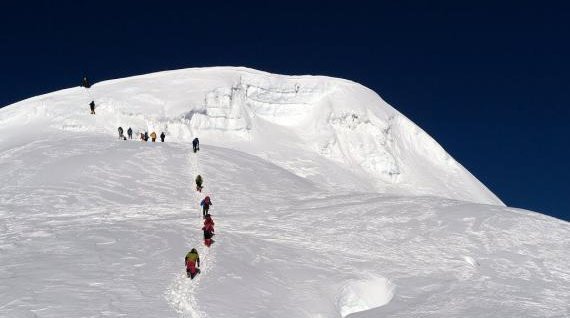Standing at 6,189 meters (20,305 feet), Island Peak offers the perfect introduction to Himalayan climbing. Known locally as Imja Tse, this stunning peak in the Khumbu region combines trekking adventure with real mountaineering experience.
Our Island Peak climbing cost and itinerary package delivers exceptional value at just $2,150 for a comprehensive 22-day journey. This includes the classic Everest Base Camp trek for proper acclimatization, followed by an exhilarating summit attempt.
Eric Shipton's team named it "Island Peak" in 1951 because it appears as an island in a sea of ice when viewed from Dingboche. Today, it stands as Nepal's most popular trekking peak, with success rates reaching 70-85% for well-prepared climbers.
Trip Highlights
Summit Achievement
- Conquer a genuine 6,189m Himalayan peak
- Experience real mountaineering with ice axes and crampons
- Enjoy 360-degree panoramic views from the summit
Iconic Mountain Views
- Mount Everest (8,849m) - The world's highest peak
- Lhotse (8,516m) - Fourth highest mountain
- Ama Dablam (6,812m) - The "Matterhorn of the Himalayas"
- Makalu, Cho Oyu, and dozens more
Complete Adventure Package
- Two bucket-list experiences: EBC trek + Island Peak summit
- All permits, meals, and accommodations included
- Domestic flights covered (Kathmandu-Lukla-Kathmandu)
- Professional Sherpa guides with 1:2 ratio on summit day
Cultural Immersion Experience authentic Sherpa culture through village stays, monastery visits, and traditional hospitality. The journey takes you through the heart of the Sagarmatha National Park, a UNESCO World Heritage site.
Brief 22-Day Island Peak Climbing Itinerary
Week 1: Kathmandu to Everest Region
Day 1: Arrive Kathmandu (1,350m) - Team meeting and gear check
Day 2: Fly to Lukla, trek to Phakding (2,610m)
Day 3: Trek to Namche Bazaar (3,440m) - Gateway to Everest
Day 4: Acclimatization day - Explore Namche
Day 5: Trek to Tengboche (3,860m) - Famous monastery
Day 6: Trek to Dingboche (4,410m)
Day 7: Rest day for acclimatization
Week 2: EBC and Climbing Preparation
Day 8: Trek to Lobuche (4,940m)
Day 9: Everest Base Camp visit, overnight at Gorak Shep
Day 10: Kala Patthar sunrise, descend to Dingboche
Day 11: Trek to Chhukung valley (4,730m)
Day 12: Pre-climb training with equipment
Day 13: Move to Island Peak Base Camp (5,200m)
Day 14: Ascend to High Camp (5,600m)
Week 3: Summit and Return
Day 15: SUMMIT DAY - Start 2 AM, summit by 9 AM
Day 16: Weather contingency day
Day 17-19: Descend via Pangboche and Namche to Lukla
Day 20: Fly back to Kathmandu
Day 21: Rest day and celebration dinner
Day 22: International departure
Why Choose Island Peak for Your Himalayan Climbing Adventure?
The Perfect First Himalayan Peak
Island Peak bridges the gap between trekking and serious mountaineering. With a difficulty rating of PD (Peu Difficile), it's challenging enough to be rewarding yet accessible to motivated beginners.
You'll learn essential mountaineering skills:
- Using crampons on steep ice (45-50 degrees)
- Ice axe techniques for self-arrest
- Ascending fixed ropes with jumars
- Glacier navigation and crevasse awareness
The approach through the Everest Base Camp trek provides natural acclimatization while immersing you in the world's most spectacular mountain scenery. No other trekking peak offers this combination of accessibility, beauty, and genuine climbing experience.
What Makes Island Peak Special
Unlike remote peaks requiring weeks of camping, Island Peak's approach follows established tea house routes. You'll sleep in comfortable lodges, enjoy hot meals, and experience Sherpa culture firsthand. Only the final three nights require camping.
The summit day provides real mountaineering thrills. Starting at 2 AM under a canopy of stars, you'll navigate:
- Rocky scrambles to the glacier
- Hidden crevasses requiring rope teams
- Steep snow slopes demanding good technique
- The famous 100-meter headwall at 60 degrees
- A narrow, exposed summit ridge
Standing on top, the entire Lhotse massif fills your vision to the north, while Makalu dominates the eastern horizon. It's a view reserved for those willing to push beyond ordinary trekking.
Island Peak vs Other Trekking Peaks
Why climbers choose Island Peak:
Island Peak offers better infrastructure than Mera Peak, despite being slightly lower. The established rescue protocols and proximity to Everest Base Camp make it safer for beginners. Unlike Lobuche East, which sees fewer climbers and has a steeper learning curve, Island Peak provides a more gradual introduction to Himalayan climbing.
Comprehensive Island Peak Climbing Cost Breakdown
Total Package Cost: $2,150 (All-Inclusive for 22 Days)
Understanding where your money goes helps you appreciate the value of our package. Here's a detailed breakdown with no hidden costs.
Permits and Official Fees ($450)
- Island Peak Climbing Permit: $250 (Spring), $125 (Autumn)
- Sagarmatha National Park Entry: $30
- Khumbu Local Area Permit: $20
- Garbage Deposit: $500 (refundable)
Transportation Costs ($400)
Round-trip flights between Kathmandu and Lukla cost $380 per person. This includes checked baggage allowance for climbing gear. Airport transfers and all ground transportation in Kathmandu are covered.
Guide and Porter Services ($600)
Our experienced team ensures your safety and success:
- Lead climbing guide (IFMGA certified): $30/day
- Assistant guides for larger groups: $20/day
- Porters (carrying up to 30kg): $15/day
- Base camp cook and kitchen crew: Included
Note: Tips for staff are additional (budget $250-300 total)
Accommodation and Meals ($500)
In Kathmandu:
- 3 nights in tourist-standard hotel (twin sharing)
- Welcome and farewell dinners included
During the Trek: Tea house accommodations cost $5-10 per night, increasing with altitude. All meals are included - breakfast, lunch, dinner, plus tea/coffee. Expect hearty local dishes like dal bhat, as well as Western options.
At Base Camp: Quality mountain tents, dining tent, toilet tent, and all camping equipment provided. Our kitchen crew prepares fresh, high-energy meals even at altitude.
Climbing Equipment and Services ($200)
Group Equipment Provided:
- 200m of fixed rope for summit day
- Ice screws, snow bars, and anchors
- Comprehensive first aid kit
- Satellite phone for emergencies
- Emergency oxygen and mask
Personal Gear Rental Available:
- Climbing boots: $50
- Crampons: $25
- Ice axe: $20
- Harness: $15
- Helmet: $15
What's NOT Included
Budget separately for these items:
- International airfare ($800-1,500)
- Nepal entry visa ($50)
- Travel insurance with rescue coverage (mandatory, $200-400)
- Personal climbing gear and clothing ($500-1,000)
- Hot showers and charging batteries ($3-5 each)
- Alcoholic beverages and snacks
- Tips for guides and porters ($250-300 recommended)
- Emergency helicopter evacuation (covered by your insurance)
Price Comparison
Our $2,150 package offers exceptional value compared to international operators charging $3,000-4,500. We maintain the same safety standards with experienced guides and proven success rates. The difference? We're a local operation with direct relationships, eliminating middleman costs while maintaining quality.
Essential Preparation for Island Peak Success
Physical Training Program
Start training 3-4 months before departure. Island Peak demands endurance more than explosive strength.
Build Your Base Fitness:
Focus on cardiovascular endurance through hiking, running, or cycling. Aim for 4-5 training sessions weekly, gradually increasing intensity. Include at least one long hike weekly with a weighted pack (15-20kg).
Strength training should emphasize legs and core. Squats, lunges, and step-ups prepare your muscles for thousands of uphill steps. Don't neglect upper body work - you'll need arm strength for using ice axes and pulling on fixed ropes.
Altitude Preparation:
While you can't fully prepare for altitude at sea level, certain strategies help:
- Sleep in an altitude tent if available
- Plan training hikes to high elevations
- Practice yoga for breath control
- Stay well-hydrated always
Mental Preparation
Summit day challenges your mind as much as your body. When you're exhausted at 6,000m, mental strength makes the difference between success and turning back.
Visualization helps tremendously. Spend time imagining yourself on summit day - the cold, the fatigue, the exposure - and see yourself pushing through. Read accounts from successful climbers. Understand that discomfort is temporary, but the achievement lasts forever.
Gear Essentials for Island Peak
The Big Three:
- Boots: Insulated climbing boots rated to -30°C
- Sleeping Bag: Rated to at least -20°C
- Down Jacket: 800-fill minimum for summit day
Layering System:
- Merino wool base layers (2 sets)
- Insulating mid-layers (fleece or synthetic)
- Waterproof shell jacket and pants
- Summit suit or insulated pants
Technical Equipment:
- Climbing harness (adjustable for layers)
- Dynamic rope (30m for glacier travel)
- Carabiners (6-8 locking and non-locking)
- Prusik cords for backup
- Headlamps (bring two with extra batteries)
Safety, Weather, and Risk Management
Understanding Altitude Risks
Altitude affects everyone differently, regardless of fitness. Our itinerary includes strategic acclimatization days, following the golden rule: climb high, sleep low.
We monitor your health daily using pulse oximeters and health checks. Signs of altitude sickness are taken seriously:
- Persistent headaches warrant extra rest
- Nausea or vomiting means immediate descent
- Any signs of HAPE or HACE trigger evacuation
Our guides carry comprehensive medical kits including Diamox, dexamethasone, and nifedipine. A portable altitude chamber (Gamow bag) stays at base camp for emergencies.
Weather Windows and Climbing Seasons
Spring Season (March-May): Spring offers the most stable weather with temperatures ranging from -5°C to -20°C at high camp. Clear mornings are common, though afternoon clouds often build.
Autumn Season (September-November): Autumn provides crystal-clear views after the monsoon. Temperatures are slightly colder than spring, but the weather is often more predictable.
We receive daily weather forecasts via satellite. Summit attempts only proceed with favorable conditions:
- Wind speeds below 30km/h
- No precipitation forecast
- Stable pressure systems
- Clear visibility expected
Technical Hazards and Mitigation
The main hazards on Island Peak are manageable with proper precautions:
Crevasse Falls: The glacier section contains hidden crevasses. We rope teams together and guides probe suspicious areas.
Avalanche Risk: Minimal on our route, but we start early to avoid warming snow conditions.
Weather Changes: Mountain weather shifts rapidly. We carry emergency equipment and maintain conservative decision-making.
Booking Your Island Peak Adventure
Secure Your Spot
Our small group sizes ensure quality experiences but fill quickly. Book 3-6 months ahead for peak season.
Booking Process:
- Complete online application form
- Submit medical fitness certificate
- Pay 30% deposit to confirm
- Receive detailed preparation guide
- Final payment 60 days before departure
Payment Options:
- Credit/debit cards (3% fee)
- Wire transfer (no fee)
- PayPal available
- Installment plans possible
Group Sizes and Private Trips
We limit groups to 8 climbers maximum, ensuring personalized attention and flexibility. Private trips are available for those preferring exclusive experiences. Custom dates and modified itineraries can be arranged with advance notice.
Cancellation and Insurance
Our flexible cancellation policy:
- 90+ days before: Full refund minus $200 admin fee
- 60-89 days: 50% refund
- 30-59 days: 25% refund
- Less than 30 days: No refund
Your travel insurance must include:
- Emergency evacuation coverage to $100,000
- Altitude coverage to 6,500m
- Rescue and repatriation
- Trip cancellation protection
Final Thoughts
Island Peak represents more than just another tick on your adventure list. It's a genuine mountaineering experience that pushes your limits while remaining achievable for motivated individuals.
At $2,150 for our all-inclusive 22-day package, you're investing in professional guidance, proven logistics, and memories that last a lifetime. You'll return home with new skills, incredible stories, and the confidence that comes from standing on a Himalayan summit.
The mountains are calling. Your Island Peak climbing adventure awaits.
Ready to climb Island Peak? Contact Himalayan Hero today:
Early bird special: Book 4+ months ahead for 5% discount Group discount: 10% off for 4+ climbers





